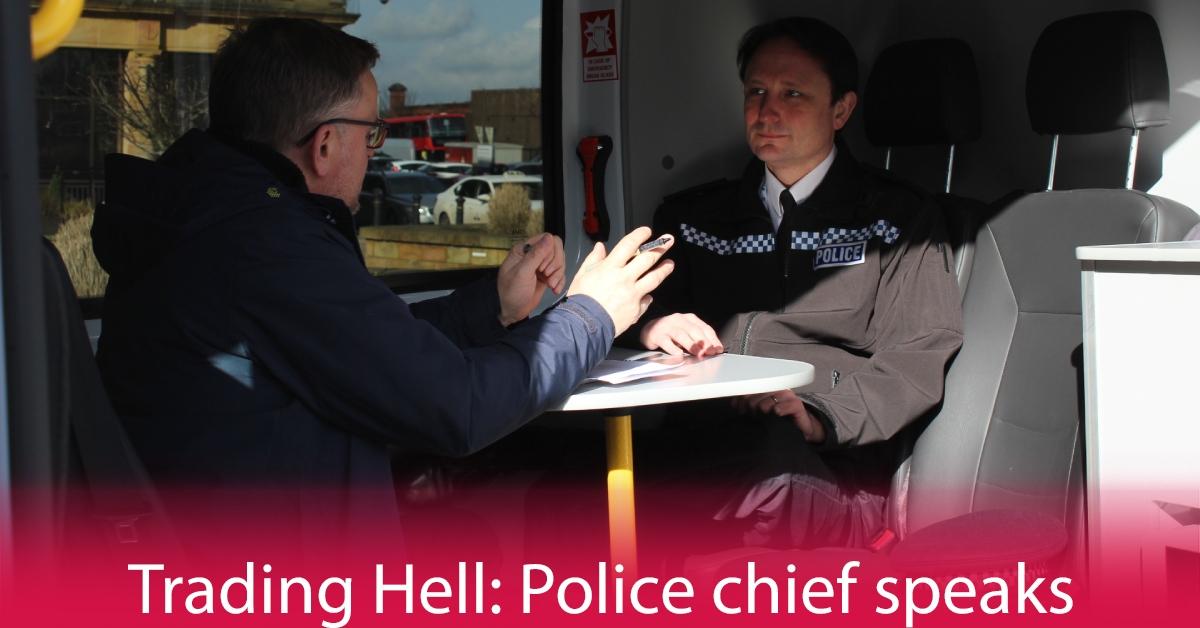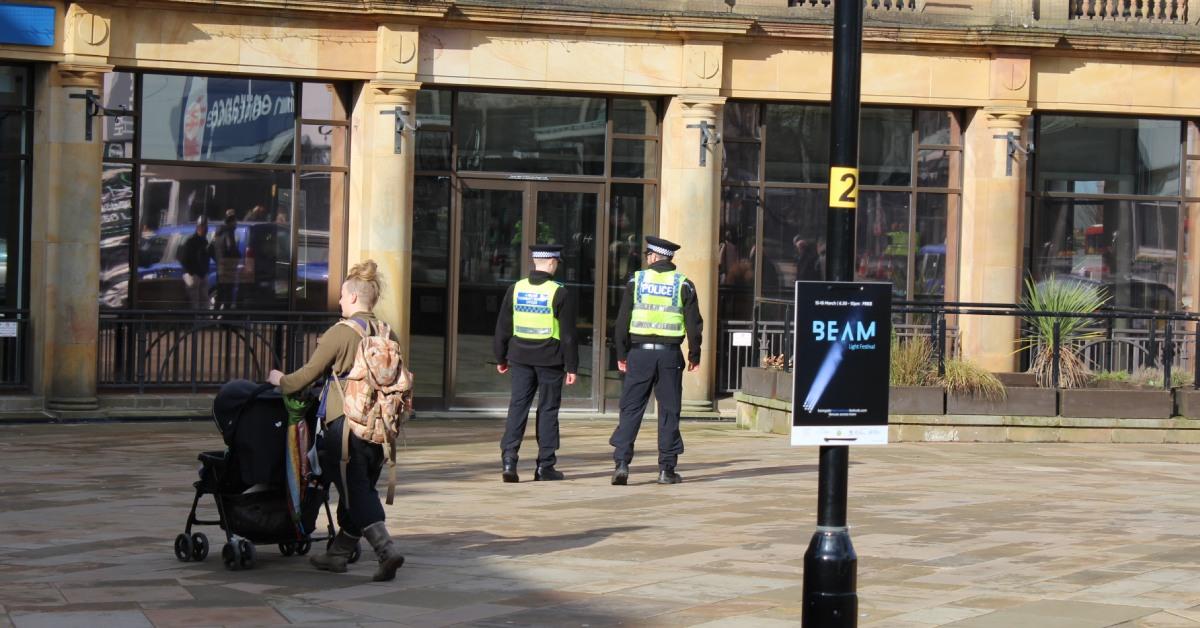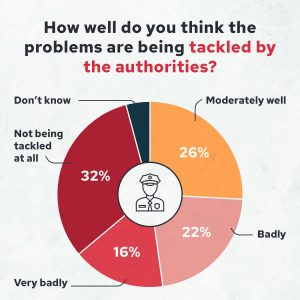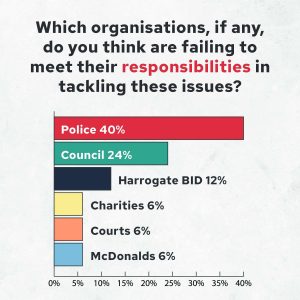Subscribe to trusted local news
In a time of both misinformation and too much information, quality journalism is more crucial than ever. By subscribing, you can help us get the story right.
- Subscription costs less than £1 a week with an annual plan.
Already a subscriber? Log in here.
21
Mar 2024
Trading Hell: 'We can't arrest our way out of it', says police chief

This is the fourth in our Trading Hell series of features investigating anti-social behaviour and crime in Harrogate town centre.
Levels of crime and anti-social behaviour have increased so much in Harrogate town centre that traders are desperate for a stronger police presence, the Stray Ferret has found.
The Trading Hell survey we carried out recently found that more than two in three town-centre businesses (68%) want to see more bobbies on the beat.
So when the Stray Ferret met Chief Inspector Simon Williamson of North Yorkshire Police (NYP) in town to ask him about our findings, it came across as a signal of intent when he was accompanied by a squad of police officers, who headed off in twos with a NYP photographer to patrol the main shopping streets. The officers’ hi-vis stab-vests make for an arresting sight – in recent years they’ve been conspicuous by their absence.
It was, of course, choreographed. More than seven weeks after first asking for an interview, our request was finally granted on the very day Ch Insp Williamson wanted to publicise a new initiative.
Project Spotlight
North Yorkshire Police says Project Spotlight will mean increased patrols and activity in Harrogate town centre to tackle street crime, retail theft, begging, rough sleeping, substance abuse and anti-social behaviour.
Yet despite repeated requests, North Yorkshire Police would not tell us how many officers have been patrolling the town centre up to now, or how often, citing “operational reasons”. So it's impossible for us to accurately report just how much of an increase Project Spotlight represents. Nor is it clear how long Project Spotlight is set to last.
But in a statement, a spokesperson said:
The initiative officially launched last Wednesday, but it’s a project that Ch Insp Williamson has been considering since he took up his post as officer responsible for North Yorkshire Police's neighbourhood teams in December. He said:

Project Spotlight will see increased patrols in Harrogate town centre to deter crime and restore public confidence.
‘Lawless’
Whatever the reason for the timing of Project Spotlight, it is sure to be welcomed by traders in Harrogate town centre, but only if they experience noticeable, sustained improvement.
Our survey covered almost all the businesses on Oxford Street, Cambridge Street, Cambridge Road, Market Place and the Victoria Shopping Centre, as well as parts of Beulah Street and James Street. When we spoke to traders, the message came across loud and clear that many of them were sick of the problems that are prevalent in parts of central Harrogate and wanted to see change.
Almost every business polled (96%) said that anti-social behaviour is a problem, and more than two thirds said street-drinking (74%), rough sleeping (70%), begging (68%) and drug misuse (66%) were also problems. One in five (20%) experienced threats to staff at least once a week.

Nearly three in every four businesses (74%) said they had lost trade as a result of some or all of these behaviours.
Some traders used words such as “crisis” and described the town centre as “lawless”.
Ch Insp Williamson is unsurprised. He said:
Grey area
Official figures reveal that North Yorkshire Police could have been tackling the problem with more vigour, and in fact were doing so until 2020. In that year, the force used the Vagrancy Act 13 times to arrest people for offences such as persistent begging and street drinking, but hasn’t used it once since then. When asked why not, Ch Insp Williamson told us:
But this turns out to be a grey area. The Act was indeed repealed in 2022 by the Police, Crime, Sentencing and Courts Act, but remains in force until it is replaced. Alternative legislation in the form of the Criminal Justice Bill is making its way slowly through parliament, but in the meantime, the Vagrancy Act can still be used, and is being by police forces across the country. Last year, The Guardian revealed that officers from 29 police forces across England and Wales arrested 1,173 people between 2021 and 2023 – showing that it was an option open to North Yorkshire Police. 
‘Organised bands of beggars’
Its continued use would likely be welcomed by Harrogate’s town-centre traders. In our Trading Hell survey, 50% said they would like to see the police given more powers to move people on.
Another concern raised by several store managers was the persistent rumour that some of the problems they face are caused by people from neighbouring cities. We heard stories of “gangs of shoplifters” and “organised bands of beggars” commuting from Leeds, Bradford and elsewhere to take advantage of the “rich pickings” to be found in Harrogate.
But Ch Insp Williamson said the rumours were largely unfounded. He told us:
This contradicts what several other sources have told us. For example, Matthew Chapman, manager of Harrogate BID (business improvement district), said:
Ch Insp Williamson denies this. He said:
Response to thefts
One issue that is significant for North Yorkshire Police is the public’s perception of the job they’re doing. When the Stray Ferret spoke to shopkeepers and store managers in central Harrogate, several told us that the police “didn’t do anything” when thefts were reported. One said “they don’t bother if it’s worth less than 200 quid”. Some have even stopped reporting thefts.
Is Ch Insp Williamson worried? He said:

‘The solution isn’t to arrest our way out of it’
Equally concerning for the police is the response to another question in our survey. Asked “Which organisations, if any, do you think are failing to meet their responsibilities in tackling these issues?”, 40% of traders explicitly named the police – far more than named any other organisation.
Ch Insp Williamson responded:
Tomorrow, we hear from Matthew Chapman, manager of Harrogate BID, about one possible solution to the problems faced by town-centre businesses.
Read more:
- Trading Hell: A Stray Ferret investigation reveals how Harrogate shop workers routinely face threats, shoplifting and anti-social behaviour
- Trading Hell: Shocking rise in shoplifting in Harrogate town centre
- Trading Hell: ‘We cannot force people to do something’, says homeless charity
0